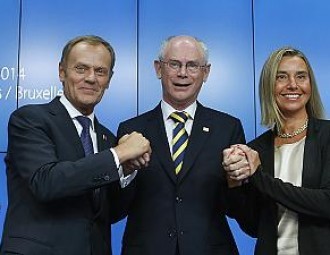Uladzimir Matskevich: The EU will choose moderation towards Belarus

It is no use expecting the change of course in Brussels-Minsk relations in connection with the rearrangement in the EU higher authorities.
A Brussels summit which took place on August 30, assigned Donald Tusk, Poland’s prime minister, who is to replace Herman Van Rompuy of Belgium, as president of the European Council, and Federica Mogherini, the Italian foreign minister, who is to replace Catherine Ashton of England, as the European Union's next High Representative for Foreign Affairs and Security Policy/Vice President of the Commission.
Belarusan authorities don’t have any particular affinities with Poland, blaming it in unfriendly attitude and support of the opposition. As well Russia, which pointed out at Poland as at the main ally of Ukraine in Europe. Should we expect that with the appointment of the Poland’s prime minister as president of the European Council the EU policy would change? As over the last time Europe is accused of indecisiveness at the time of the escalation of the Russia-Ukraine conflict. As Uladzimir Matskevich, the head of the Board of the International Consortium “EuroBelarus”, recalls, the authority and the functions of the president of the European Council are “very, very limited”.
- It is a representative role, which means that likewise his predecessor Rompuy, Donald Tusk is to represent the European Council together with other countries or international unions that are not a part of the EU, - noted Uladzimir Matskevich in the interview with the EuroBelarus Information Service. – Let me emphasize that the head of the European Council is only presiding at the sessions of the higher body, where the European policy is elaborated. And it is big players that elaborate it taking into account the rest of the EU countries.
Uladzimir Matskevich notes that in these two appointments the figure of Federica Mogherini, the Italian foreign minister, seems much more significant.
- A Representative for Foreign Affairs works in close contact with the EU Commission and those EU commissions, which are cooperating with other countries, including Good Neighborhood Committee, which was working with Belarus. Donald Tusk won’t be dealing directly with these relations, he will be voicing the position elaborated by the European Council, no more. Of course, the election of Tusk puts the role of Poland in the EU Council to a new level; however, Poland, as well as Estonia, Latvia, and a number of other Eastern-European countries were unable to block the election of Federica Mogherini to the position of the head of the European diplomacy. So who was chosen? The Italian foreign minister, a socialist, who was accused of close relations with Russia and support of Russian initiatives for the South Stream project, and also blamed of very careful assessment of Russia’s actions in Ukraine. That is why I believe that this figure is more important in forecasting changes in EU-Belarus relations. Besides, even now Italians object to rigid sanctions against Russia. So it is no use cherishing hopes for the rearrangement in the EU authorities. Nevertheless, the European policy will be revised, and the moods in the European Council will be changing, too – both towards Russia, as well as towards Belarus. But if we take Belarus, Realpolitik principle will be implemented; i.e. in the current situation Europeans will prefer moderation towards Belarusan dictatorship and Lukashenka in order to keep Belarus away from supporting Kremlin’s policy in Ukraine. It doesn’t mean, though, that Europeans are taking back all their former statements and resolutions on Belarus; but they certainly won’t proceed quickly.
-
03.01
-
07.10
-
22.09
-
17.08
-
12.08
-
30.09








































